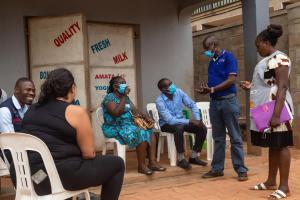Rapid response teams bolster Uganda’s Ebola fight
Mubende – First meeting at 8:00am, last one at 7:00pm. In between, Hilda Wesonga untiringly goes from one village to another to sensitize communities on the current Ebola outbreak. Some evenings, Wesonga features on radio talk-shows where she answers listeners’ questions about the disease, how to protect oneself and where to seek care. This has been her daily routine for the last 58 days.
Wesonga is one of the 48 Rapid Response Teams (RRTs) trained and supported by the World Health Organization (WHO) to respond to the Sudan Ebolavirus outbreak in Uganda, who were deployed to Mubende and Kassanda districts, where the first cases were reported. “We were deployed in Mubende two days after the first case was confirmed to engage with communities and ensure they understand the disease and play their role in the response,” explains Wesonga, whose field of expertise is risk communication and community engagement.
A total of 840 Rapid Response Teams members were trained between December 2020 and April 2022 to support the COVID-19 response. In June 2022, WHO launched the Rapid Response Teams Training and Implementation Package, with 86 Ministry of Health staff trained either as trainers of trainers or national rapid response team members. Since the ongoing Ebola outbreak was declared in September, 60 Rapid Response Team members have been deployed in the districts that reported cases, including Kassanda and Kyegegwa districts, as well as Masaka city and the capital Kampala. They also have been working in districts where no cases have been recorded, but where contacts live, to ensure communities and health workers are prepared to rapidly respond to any potential infection.
Due to its complexity, the response to the Ebola outbreak requires combined efforts of all experts. “When we trained as RRTs, we were from different fields. They wanted those who could handle surveillance, laboratory, risk communication, case management, coordination and logistics,” explains Benard Wandera, a surveillance focal person in Bunyangabu district trained as a rapid respond team member.
The diversity of skills among the Rapid Response Team members is what makes these first responders instrumental, reckons Wandera.
“On deployment, you find yourself indirectly handling all aspects of the response. For example, if your expertise is surveillance, you find yourself also handling some bit of risk communication, coordination and logistics among others,” Wandera says. “When we go to a village for contact tracing or follow up, we do risk communication and surveillance at the same time. After talking to the people about how Ebola spreads and how to prevent it, we start looking for contacts.”
“The rapid response teams are the first responders when we have emergences. They support all aspects of the emergence response,” says Maureen Nyonyintono, an epidemiologist at the WHO Uganda office. “These standby teams readily responded in the first week and have since contributed technically to the Ebola response. Their role is absolutely essential.”
Though health authorities make huge efforts to communicate on the danger of the disease and the need to quickly refer any suspected case to health facilities, many communities remain doubtful when initial engagement is made. “When the community is green about what you are going to talk about, they will always have a lot of questions that will need answers. And, of course, you will take time to answer those questions so as to build trust,” says Wesonga.
Wesonga’s work on risk communication involves community dialogues on Ebola with different groups, disseminating appropriate information and educational materials and attending radio talk shows. Over the last two months, Wesonga and her colleagues have reached more than 25 000 people in Mubende and Kassanda districts. “Everywhere I have gone, people are satisfied. The awareness is high. We are now dealing with behavioural change, which process takes time,” says Wesonga.
The Rapid Response Teams are mindful of infection prevention and control (IPC) measures as they go about their work. “IPC measures while in the field form part of our orientation package. For example, we maintain some distance from each person, in addition to using the basic personal protective equipment like face masks and sanitizers. We also avoid eating, sitting or touching anything while in the field,” explains Wandera.
The work of the Rapid Response Teams facilitated mounting of full-scale emergency response. The collective efforts are paying off. Over the last three weeks, the outbreak has slowed down in six districts, with two dropping from the follow-up list as they have reported no cases in over 42 days.
“The Rapid response teams, that played a crucial role in building the foundation of the response that is now fully deployed and is bearing fruit. Efforts must nevertheless be scaled up and sustain so we can bring this outbreak under control,” says Dr Yonas Tegegn, WHO Representative in Uganda.
Communications Officer
WHO Uganda
Email: tcheutchouae [at] who.int (tcheutchouae[at]who[dot]int)
Communication Officer
Regional Office for Africa
Email: defaitv [at] who.int (defaitv[at]who[dot]int)
